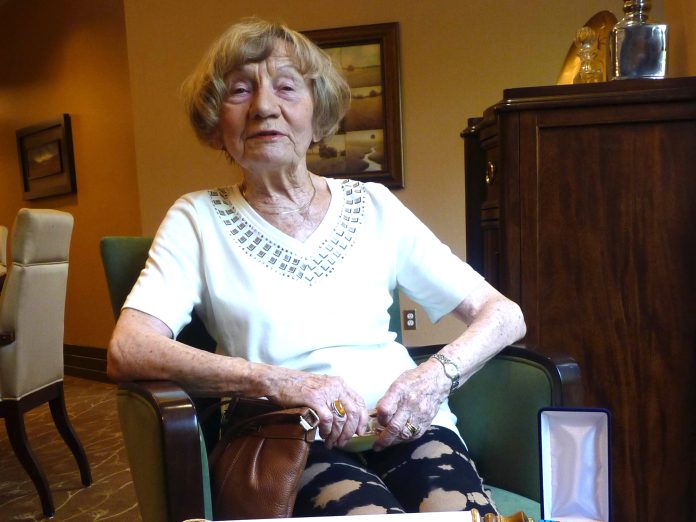
Story and photo by Judith van Berkom –
Irena Szpak was a 12-year-old Girl Guide in 1939 when the Polish resistance recruited her to be a messenger. The Polish Embassy in Ottawa ‘found’ her at Amica this year and on May 28, presented her with a medal of honour for her part in the Warsaw Uprising of 1944.
Szpak’s memoir, Trains: A Journey of Remembrances, published in 2006 when she was 79, is an account of her experiences during the war as a messenger, later as a prisoner of war, and her post-war experiences as a displaced young person. She never returned to Poland after the war.
“My mother told me never to come back,” she explains. “Some resistance fighters who went back were put in prison or executed – told they were spies or traitors.”
Mother of three, author, resistance fighter, POW – her memoir speaks of a life well lived, filled with hardship and the idealistic hope of creating a better future.
“They needed messengers [during the war],” explains Szpak. “It was impossible to use phones for underground work. There was no other way than to deliver hand-to-hand. Some were trained as nurses to look after the wounded. We worked as couriers. It was hard work. Training involved learning different pathways through the city.”
In her description of the Warsaw Uprising of 1944, in which she took an active part at age 17, Szpak writes about the intent to overthrow the Germans by collaborating with the advancing Russian Red Army. Instead of coming to their aid, however, the Polish underground was left to fight the Germans alone. Planes from Britain and other allied countries were not permitted to land and what was supposed to be a three day overthrow of the German occupation of Warsaw, lasted a total of 63 days and ended in defeat and surrender. Warsaw was completely destroyed.
“After 60 days [of fighting] we had no food or water,” describes Szpak. “Allied forces won the right to treat us [resistance fighters] as soldiers; otherwise the Germans would have shot us all. [Instead] they were sent to POW camps. There were almost 2000 women in the camp – POW camps were located all over Germany.”
Szpak was taken prisoner on October 4, 1944, eventually landing in a POW camp near the Dutch border. Her memories of that time in her life are crystal clear.
“It was a big barrack with double or triple bed bunks, located in a bog – a very unhealthy climate. We were so hungry – I was dreaming of food.”
The camp was liberated on April 12, 1945 – “the day Roosevelt died.”
Szpak describes the day of liberation as “one of the most fantastic experiences” of her life. “You learn how to appreciate freedom,” she adds.
Liberation was a time of great confusion. The communist government in Poland was under the power of the Soviet Union at a time when the rest of Europe was free.
There had been a smaller Jewish uprising of short duration in 1943, Szpak explains, but the Warsaw Uprising – which had lasted more than two months – was obliterated from memory.
“Children were taught not to talk about it,” says Szpak.
After her release from the camp, Szpak had the opportunity to go back to school in Haren, Germany where she finished high school. From there she went to university, won a scholarship and studied economics.
“I thought Poland would need economists to rebuild the country,” says Szpak.
Szpak reflects that mothers suffered the most during the war. “Young people don’t care. They are idealistic and patriotic. We didn’t think much – but mothers, poor mothers.”
Irena Szpak’s memoir, Trains: A Journey of Remembrances, is available on amazon.ca.
